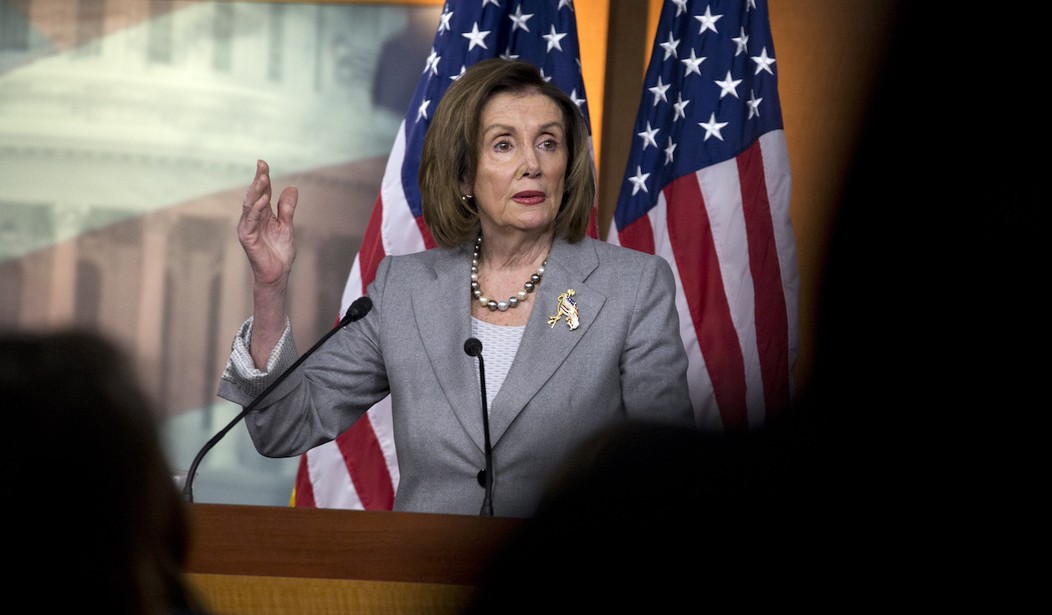The Cancel Culture has arrived in Congress. On Thursday, House Speaker Nancy Pelosi (D-Calif.) ordered the portraits of four previous House speakers removed from the U.S. Capitol Building before the celebration of Juneteenth, which commemorates the freeing of the last slaves in the United States in Galveston, Texas, on June 19, 1865.
“This Juneteenth must be a day of reflection that moves our nation to finally confront and combat its long and shameful history of systemic racial injustice targeted at communities of color. That is why, this week, I have ordered the removal of portraits of Confederate leaders from the U.S. Capitol and, earlier this month, renewed my call for the removal of statues of Confederate soldiers and officials displayed in this hallowed space,” Pelosi said in a statement on Friday, Juneteenth.
“The halls of Congress are the heart of our democracy and should reflect our highest ideals, not memorialize men who embody racism, bigotry and hatred,” Pelosi added.
The four portraits Pelosi ordered removed commemorated Robert Hunter of Virginia, who served as speaker from 1839 to 1841, Howell Cobb of Georgia (1849 to 1851), James Orr of South Carolina (1857 to 1859), and Charles Crisp of Georgia (1891 to 1895), ABC News reported. Each of these men was a Democrat.
Hunter became the Confederate secretary of State, while Cobb led the Confederate States Provisional Congress. Orr served in the Confederate States Senate, and later became governor of South Carolina during Reconstruction. Crisp fought for the Confederacy before his political career. He became a prisoner of war but later decided to run for office in the Union Congress.
Hunter, Cobb, and Orr helped create the conditions for the Confederacy, leading the Democrat-dominated House of Representatives to approve the extension of the horrific institution of race-based slavery into the territories. The South seceded in response to the election of Abraham Lincoln — who opposed not slavery itself but the expansion of slavery.
The gold-framed portraits of four former Speakers of the House of Representatives who shared ties to the Confederacy have been removed from the walls of the U.S. Capitol. https://t.co/tMHp1EEcOO pic.twitter.com/oTCsQl4d6k
— ABC News (@ABC) June 18, 2020
6 Historical Figures Whose Statues SJWs Should Also Remove
Yet there is something grotesque in a House speaker removing the busts of previous House speakers. While these men were traitors, fighting a rebellion against the United States in an unjust cause, they still served as speakers of the House — the very same position Pelosi herself now occupies. One of these men, Charles Crisp, served in Congress after the Civil War.
The Cancel Culture has come for a whole host of statues — and not just those honoring Confederates. Vandals targeted a statue commemorating the first black volunteer regiment, which fought for the Union. Others targeted Winston Churchill, the most influential anti-fascist. Vandals most recently targeted a statue of America’s first president, George Washington, in Portland, Ore.
If Pelosi wants to remove portraits that “memorialize men who embody racism, bigotry and hatred” from Congress and she believes that Republicans like Donald Trump “embody racism, bigotry, and hatred,” then how long will it be before she starts removing portraits of former House Speaker Newt Gingrich? By today’s standards, most American leaders before the 1950s were racist, to some degree or another. President Woodrow Wilson pushed segregation in the 1910s.
While Americans may cheer the removal of House speakers with ties to the Confederacy, where does the striking of monuments and portraits end? Erasing history is not new, but it is worrisome nonetheless. In ancient Egypt, some pharaohs purged all signs of the previous pharaoh for political reasons.
If Pelosi and the Cancel Culture zealots bring this trend to its natural conclusion, they will erase the heroes to whom generations of Americans looked for inspiration. America would be so much poorer were it not for the examples of George Washington, who voluntarily stepped down from power, or Abraham Lincoln, who humbly led America through its horrific Civil War. Yet Washington owned slaves, and Lincoln said he would allow slavery to continue if it would reunite the Union.
Juneteenth is a time of sober celebration — a time to reflect on the horrors of slavery and to hail the victory of freedom over bondage. Americans should celebrate the defeat of the Confederacy, but we should also remember that the Civil War was part of our heritage. Lincoln would not be nearly so much of a hero if the South had not seceded to expand slavery, just as Washington would not be a hero if Parliament had agreed to grant the American colonists representation in exchange for taxation. Erasing the villains makes it harder for the heroes to shine.
The United States Capitol should have a section with House speakers who served in the Confederacy. That section of the wall should remind Americans of our complicated history, and it should make the celebration of Juneteenth that much sweeter.
Tyler O’Neil is the author of Making Hate Pay: The Corruption of the Southern Poverty Law Center. Follow him on Twitter at @Tyler2ONeil.









Join the conversation as a VIP Member